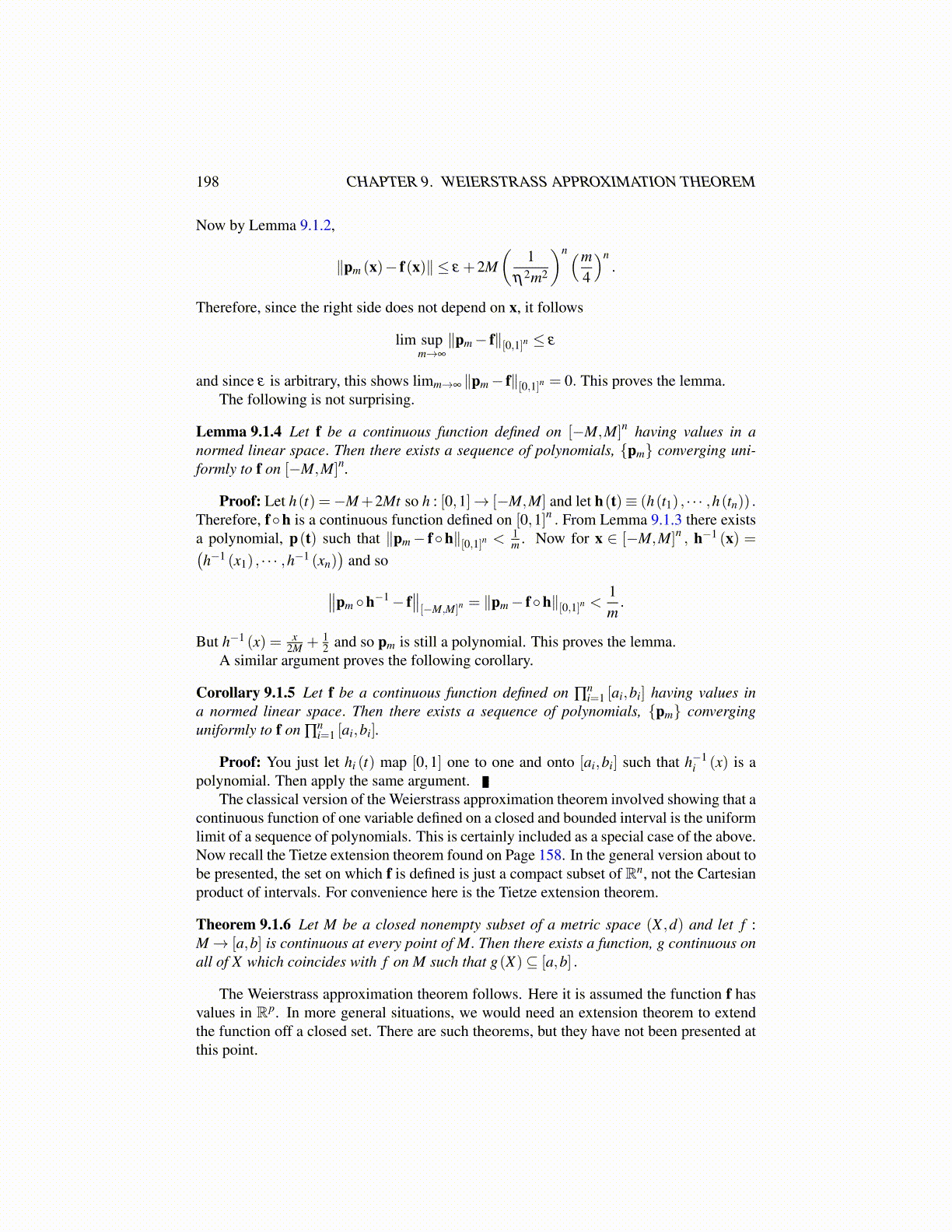
198 CHAPTER 9. WEIERSTRASS APPROXIMATION THEOREM
Now by Lemma 9.1.2,
∥pm (x)− f(x)∥ ≤ ε +2M(
1η2m2
)n(m4
)n.
Therefore, since the right side does not depend on x, it follows
lim supm→∞
∥pm− f∥[0,1]n ≤ ε
and since ε is arbitrary, this shows limm→∞ ∥pm− f∥[0,1]n = 0. This proves the lemma.The following is not surprising.
Lemma 9.1.4 Let f be a continuous function defined on [−M,M]n having values in anormed linear space. Then there exists a sequence of polynomials, {pm} converging uni-formly to f on [−M,M]n.
Proof: Let h(t) =−M+2Mt so h : [0,1]→ [−M,M] and let h(t)≡ (h(t1) , · · · ,h(tn)) .Therefore, f◦h is a continuous function defined on [0,1]n . From Lemma 9.1.3 there existsa polynomial, p(t) such that ∥pm− f◦h∥[0,1]n < 1
m . Now for x ∈ [−M,M]n , h−1 (x) =(h−1 (x1) , · · · ,h−1 (xn)
)and so∥∥pm ◦h−1− f
∥∥[−M,M]n
= ∥pm− f◦h∥[0,1]n <1m.
But h−1 (x) = x2M + 1
2 and so pm is still a polynomial. This proves the lemma.A similar argument proves the following corollary.
Corollary 9.1.5 Let f be a continuous function defined on ∏ni=1 [ai,bi] having values in
a normed linear space. Then there exists a sequence of polynomials, {pm} converginguniformly to f on ∏
ni=1 [ai,bi].
Proof: You just let hi (t) map [0,1] one to one and onto [ai,bi] such that h−1i (x) is a
polynomial. Then apply the same argument.The classical version of the Weierstrass approximation theorem involved showing that a
continuous function of one variable defined on a closed and bounded interval is the uniformlimit of a sequence of polynomials. This is certainly included as a special case of the above.Now recall the Tietze extension theorem found on Page 158. In the general version about tobe presented, the set on which f is defined is just a compact subset of Rn, not the Cartesianproduct of intervals. For convenience here is the Tietze extension theorem.
Theorem 9.1.6 Let M be a closed nonempty subset of a metric space (X ,d) and let f :M→ [a,b] is continuous at every point of M. Then there exists a function, g continuous onall of X which coincides with f on M such that g(X)⊆ [a,b] .
The Weierstrass approximation theorem follows. Here it is assumed the function f hasvalues in Rp. In more general situations, we would need an extension theorem to extendthe function off a closed set. There are such theorems, but they have not been presented atthis point.